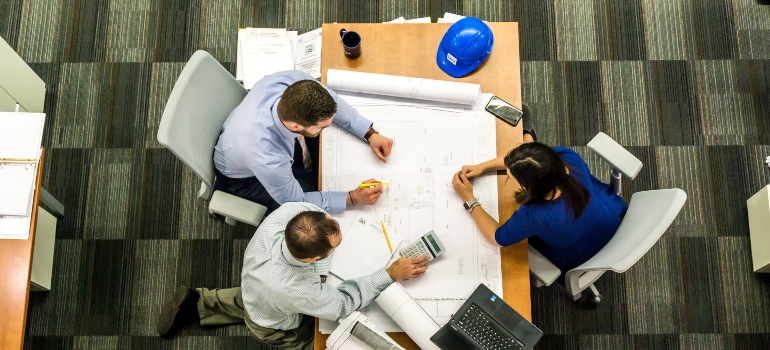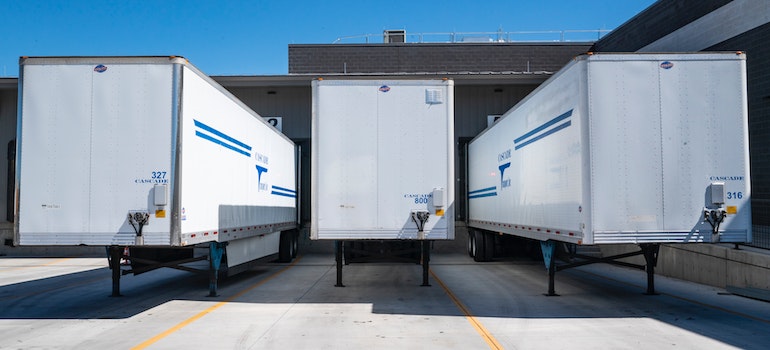How to Find Reliable Logistics Companies
In logistics, reliability is a critical factor that can make or break your operations. Hence, the choice of your Seattle WA logistics partner directly impacts cost efficiency, service quality, and customer satisfaction, whether you’re managing supply chains, handling local deliveries, or coordinating international shipments. So if you’re looking for a detailed approach to identifying and selecting the best among reliable logistics companies, this Hansen Bros. Moving & Storage guide provides a straightforward one. If you address key factors such as reputation, experience, certifications, technology, and pricing, you will gain actionable insights to make informed decisions. Take a look at what truly matters when evaluating logistics providers.
Why Reliable Logistics Can Make or Break Your Operations
A clear understanding of your logistics requirements is the foundation of a successful partnership. Without this clarity, you risk engaging a provider that lacks the necessary resources or expertise for your operations.
Begin by assessing the scale of your logistics needs. Are you handling local deliveries, regional distribution, or international shipping? Different shipping companies in Seattle specialize in specific areas, and their infrastructure may not accommodate all types of operations. For instance, local delivery services focus on last-mile transportation, while global providers offer customs brokerage and multimodal shipping options.
Equally important is identifying specific services you require. These could include:
- Warehousing.
- Real-time tracking.
- Specialized handling.
- Inventory management.
- Transit time guarantees.
- Special packaging needs.
- Flexible scalability for seasonal demand.
A reliable logistics provider should handle both your current needs and potential growth. Whether it’s peak seasons or unexpected surges, their systems and resources must adapt without compromising service quality.

How to Spot Reliable Logistics Companies
A logistics company’s reputation provides insight into its reliability and service quality. Established credibility is often a strong indicator of a provider’s ability to meet deadlines, maintain transparency, and handle challenges effectively.
To assess a company’s reputation, start by reviewing customer feedback on trusted platforms like Trustpilot or Google Reviews. Pay attention to recurring themes, such as delays, damaged goods, or poor communication. These issues can signal systemic problems within the company’s operations. Industry-specific forums and professional networks are also valuable for gaining insights from other businesses with similar needs.
Direct feedback from clients or case studies can shed light on how the company performs under various circumstances. Many reliable logistics companies showcase testimonials and success stories on their websites, but it’s wise to verify claims through independent sources. Finally, check for industry awards or recognitions that validate the company’s commitment to excellence. A provider consistently acknowledged by its peers often stands out as a reliable choice.
The Must-Have Credentials for Any Logistics Provider
Proper licensing and certifications are non-negotiable when selecting a logistics provider. Credentials demonstrate compliance with industry standards and regulatory requirements, ensuring your operations remain legally protected and efficient.
Start by confirming the company’s licensing. Depending on the scope of your operations, this might include domestic transport permits or customs brokerage licenses and international shipping certifications for international shipping companies in Seattle. Without these credentials, you risk delays, fines, or confiscated goods.
Certifications reflect a company’s commitment to quality and safety. Look for standards such as ISO 9001 for quality management or IATA certification for air cargo handling. In addition, compliance with programs like the Customs-Trade Partnership Against Terrorism (C-TPAT) or the European Union’s Authorized Economic Operator (AEO) signifies robust security measures and streamlined customs processes.
It’s crucial to verify these credentials independently. Request documentation directly from the company and cross-check with the issuing authorities. Trustworthy providers readily share this information, as it builds confidence in their services.
Choosing a Partner Who Knows the Industry Inside Out
Experience matters in logistics because it reflects a company’s ability to handle diverse scenarios and challenges. A seasoned provider brings practical knowledge and established systems to the table, minimizing risks and delays.
Evaluate how long the company has been in operation and its specialization. For example, a firm with decades of experience in cold-chain logistics is more reliable for transporting perishables than a generalist provider. Their familiarity with temperature-sensitive requirements ensures minimal spoilage and compliance with regulatory standards.
Ask about the company’s track record with businesses similar to yours. Industry-specific experience often translates into better service. For instance, a logistics partner serving the automotive industry understands just-in-time delivery demands and offers heavy equipment movers, while one focusing on retail might excel in high-volume distribution.
Experience also indicates resilience. Reliable logistics companies that have successfully managed market fluctuations, regulatory changes, or disruptions like the COVID-19 pandemic are better equipped to manage uncertainties.

Why Innovation Should Be on Your Checklist
Modern logistics relies heavily on technology to improve efficiency, accuracy, and customer satisfaction. A reliable logistics company integrates advanced systems into its operations, ensuring transparency and timely delivery.
One critical feature to look for is real-time tracking. GPS-enabled tracking systems allow you to monitor shipments at every stage, reducing uncertainty and enhancing customer communication. Automated inventory management systems also play a key role in maintaining stock accuracy and streamlining warehouse operations.
Another sign of technological competence is the provider’s digital platform. Look for online tools that simplify order placement, status updates, and issue resolution. User-friendly systems save time and reduce administrative burdens on your team.
Innovation is another factor to consider. Companies adopting technologies like artificial intelligence for demand forecasting or blockchain for supply chain transparency demonstrate a forward-thinking approach. These advancements often translate into cost savings and improved service quality.
How to Decode Pricing and Avoid Hidden Fees
Cost plays a key role in logistics decisions, but focusing solely on the lowest price can backfire. Instead, aim to balance affordability with quality service by evaluating pricing structures and transparency.
Trustworthy freight companies in Seattle provide clear cost breakdowns for their services. Transparency allows you to understand what you’re paying for and avoid hidden fees. For example, some providers might charge extra for fuel surcharges, after-hours deliveries, or customs handling. Asking detailed questions upfront ensures there are no surprises later.
Compare quotes from multiple companies to gauge market rates. However, be cautious of offers significantly below the average, as they might indicate compromised service quality or hidden costs. Look beyond the numbers and consider the value you’re receiving—timely delivery, safety, and efficient handling can outweigh marginal cost differences.
Long-term partnerships may qualify you for volume discounts or preferential rates. Negotiating these terms early can result in significant savings while ensuring consistent service.
How to Measure Customer Support and Communication
In logistics, effective communication and dependable customer support are essential. A company that fails in these areas can lead to confusion, delays, and unnecessary frustration. The best among reliable logistics companies ensures you can always get updates, address concerns, and resolve issues quickly.
Start by evaluating the company’s communication channels. Look for multiple options, such as email, phone, and live chat, to suit different needs. A provider offering 24/7 support indicates a commitment to resolving urgent issues, particularly for businesses operating across time zones.
Test their responsiveness before signing a contract. Reach out with specific questions to assess how quickly and effectively they respond. Consider how they handle unexpected scenarios, such as rerouting shipments due to weather or resolving customs delays. A well-structured escalation process for complex issues is another positive sign. Strong communication and customer support show the company values its clients and understands the importance of smooth operations.

Why Sustainability Should Be a Priority
Sustainability is no longer a bonus—it’s an expectation in the logistics industry. Choosing a company that prioritizes eco-friendly practices can benefit your brand’s reputation while contributing to environmental responsibility.
Examine the provider’s commitment to sustainability through their operations. This may include the use of fuel-efficient vehicles, electric fleets, or alternative energy sources in warehouses. Companies with robust route optimization technology reduce unnecessary mileage, cutting fuel consumption and emissions.
Also, look for certifications like Environmental Management System (EMS) or alignment with international sustainability goals. These indicators demonstrate a long-term commitment to reducing environmental impact. Discuss the company’s approach to waste reduction, such as eco-friendly packaging or recycling programs. If you prioritize sustainability, you align with global efforts to address climate change and make your supply chain more efficient.
Testing the Waters: Conducting a Trial Run
Before committing to a long-term partnership with one of the reliable logistics companies, consider conducting a trial run to evaluate the provider’s performance. This step gives you firsthand experience with their service quality and reliability.
Start with a small shipment or a limited contract to test key aspects like punctuality, accuracy, and communication. Monitor their adherence to agreed timelines, the condition of delivered goods, and the responsiveness of their customer support team during the process. A trial period also helps you gauge how the company handles unexpected challenges, such as route disruptions or last-minute changes.
Use measurable metrics during this phase. For instance, assess delivery times against promises, review tracking accuracy, and evaluate customer satisfaction with the logistics process. The insights from a trial run can help you make a more confident decision about a long-term partnership.
Flexibility and Scalability: Ensuring Long-Term Fit
Your logistics needs will evolve, whether due to market expansion, seasonal demands, or new product lines. A reliable provider should adapt to these changes without compromising service quality.
Assess the company’s flexibility in managing unexpected shifts. Can they accommodate rush orders or adjust to last-minute changes? A provider that prioritizes adaptability is less likely to cause disruptions when your plans deviate from the norm.
Scalability is equally important for long-term success. Whether it’s handling a sudden surge in holiday orders or supporting a global expansion, the company must scale its resources to meet your growing demands. Ask about their capacity to expand warehouse space, increase transportation resources, or integrate additional technology as needed. A flexible and scalable partner ensures your logistics strategy grows with your business.

Locking in the Partnership with Reliable Logistics Companies
Once you’ve identified a provider that meets your standards, it’s time to formalize the relationship. The contract sets the foundation for mutual understanding and accountability, so review it thoroughly.
Focus on key terms such as service-level agreements (SLAs), liability clauses, and dispute resolution processes. SLAs should define clear expectations for delivery times, tracking, and customer support. Discuss any penalties for missed deadlines or damaged goods to ensure accountability.
Consider building a relationship with the provider over time. Regular reviews of their performance, coupled with open communication, foster trust and allow for adjustments as your needs evolve. A solid partnership goes beyond transactions—it creates a reliable foundation for your business to thrive.
Why Choosing the Right Logistics Partner Matters
Every step outlined in this guide contributes to building a logistics network that supports efficiency, reliability, and growth. The logistics partner you choose is more than a service provider—they become an integral part of your operations. If you select a reliable company you ensure timely deliveries, better cost control, and a seamless experience for your customers. It also reduces risks like delays, damaged goods, or unexpected costs, which can harm your reputation and bottom line.
Clear communication, advanced technology, and sustainable practices lead to smoother operations and greater adaptability in a changing market. Prioritizing reputation and experience safeguards your shipments while ensuring that your supply chain remains resilient and responsive. Hence, following these steps will lead you to position your business for long-term success!
Finally, the investment of time and effort in choosing the right logistics company pays off in reduced stress, fewer disruptions, and improved customer satisfaction. A carefully chosen partner among reliable logistics companies becomes a strategic asset, enabling you to focus on what matters most: growing your business.
Why Choose Us
History
Hansen Bros. Moving & Storage is locally owned and operated by the same family for four generations, since 1890. We have a well-established reputation for service quality and reliability with a high percentage of repeat household and commercial clients.
Professionalism
We’re a certified ProMover by the American Moving and Storage Association with A+ rating with the Better Business Bureau, voted “Best in Western Washington” in 2009 and from 2011 to 2016 by KING5. Our company is fully licensed and insured and member of WMC and AMSA.
Value
Hansen Bros. Moving & Storage provide free, no-obligation in-home estimate and competitive rates, including low minimum rates for shipments moving under 300 miles. We’ve set a refund policy for unused packing materials and three Puget Sound locations to help clients save on travel fee costs.



